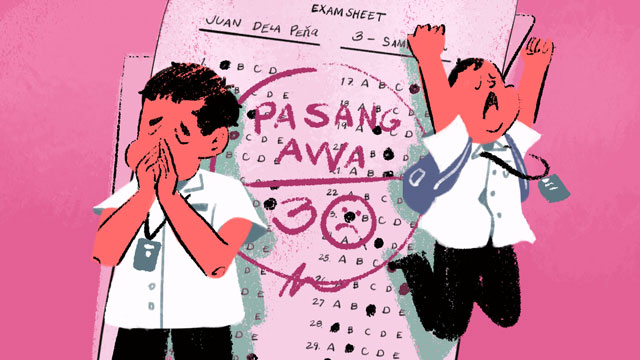

The challenge posed by Education Secretary Leonor Briones at the launch of Sulong EduKalidad was to look at the quality and status of education for "what it is." This, along with the Philippines' dismal results in the Programme for International Student Assessment (PISA), hit me hard.
Being part of the Philippine education system for almost 20 years now – 14 as a student and 5 as a professional – I have witnessed how Filipino students have grown to become fearless and careless when they get bad grades. They have become sure they will not be seeing bold red marks on their report cards.
Though it is commendable that we braved being ranked among 79 countries in the international assessment, the results were just disheartening. We placed 79th in reading comprehension and 78th in both mathematics and science. This is a bitter pill we have to swallow and a reality we have to work with. (READ: [ANALYSIS] Dismal PISA rankings: A wake-up call for Filipinos)
While the Department of Education (DepEd) aimed to prioritize and provide access to basic education and supported the No Filipino Child Left Behind Act of 2010, how schools have interpreted the DepEd's goals was the problem. (READ: Senior high school: No youth left behind?)
Just because no one should get left behind doesn't mean that we should embrace pasang-awa (barely passing) culture.
According to Briones, our students' low proficiency levels in science, math, and English are not because of the implementation of the K to 12 curriculum, like what some perceive, but because we have come to tolerate the students who exhibit low proficiency levels instead of working harder with them.
In our conscious effort to support and abide by the DepEd, we have also unconsciously misinterpreted their plan, accepting substandard outputs even if we know our learners can do more, especially with added upgrades to the Basic Education Curriculum (BEC).
Fortunately, the education department already urged educators to stop promoting non-readers to the next level. This was in response to a study by the Philippine Institute for Development Studies, which analyzed the challenges and pressures public school teachers face, and how these impact the quality of the BEC. (READ: Beyond the classroom: Advocates discuss how to make PH education more accessible)
Despite this plea, however, the culture still reigns, with only 3 months left before another school year ends.
How can this pasang-awa culture stop if it forms part of the system itself? Although there are many valid factors that determine a child's knowledge acquisition, some children, if not all, still fall victim to this degrading tradition.
It is time to focus on quality over quantity in terms of education – now more than ever. It takes a village to raise a child, however, which means that this is not just the DepEd's responsibility, but also the responsibility of stakeholders, local government, the community, and parents. We need to look past the pasang-awa culture and perform what is expected of us – para sa bata, para sa bayan (for the child, for the country). – Rappler.com
Pamela G. Garcia is a licensed professional teacher in Junior High School-English at Ligao National High School in Ligao City, Albay.